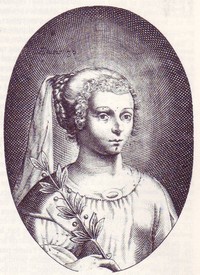 Marie de Gournay, née Le Jars
Marie de Gournay, née Le Jars
*October 6, 1565 (Prais, France)
†July 13, 1645 (Prais, France)
Marie de Gournay (née Marie Le Jars) was born in Paris on 6 October 1565, as the eldest of six children of an impoverished landed noble family in Picardy. Although purely self-taught, she became one of the most learned women of her time.
Her father, Guillaume Le Jars, bought a castle and a seigneury in Gournay-sur-Aronde before his death in 1578, when Marie only was thirteen years old. Her mother decided to establish her family in Gournay in 1586. Not caring much about her daughter’s intellectual disposition, she brought Marie up according to the “female code” of the nobility of the time. Marie was not satisfied with this upbringing and learned on her own Latin and Greek, comparing the original texts with their translations.
It was at the age of eighteen that she discovered the first edition of Michel de Montaigne’s “Essays”, which she said “filled her with admiration”. Five years later, in 1588, during a trip to Paris with her mother, she sent Montaigne a note expressing her ardent desire to see him. They met the very next day. She was twenty-three and he was fifty-five. In the months that followed, Montaigne stayed at the Château de Gournay for several weeks at a time. It was during a walk, after a joint reading of Plutarch, that she told him the story published in 1584 under the title Le Promenoir de M. de Montaigne. A deep friendship developed; and Marie became the custodian of his literary estate.
In Chapter XVII of Book II of the Essays, he calls her a “daughter of the covenant”. Marie did not see him again after this meeting, but she corresponded regularly with him. Her mother died in 1591. Marie moved to Paris, leaving the castle to her brother. Montaigne died in 1592. She did not learn of his death until fifteen months later. The philosopher’s widow sent her an annotated copy of the Essays of 1588 and asked her to take charge of their publication. She set to work and brought out the first posthumous edition of the Essays, with a long preface in which she defended Montaigne’s ideas. She died on 13 July 1645 in Paris.
Her literary production includes translations of Tacitus, Ovid, Cicero and Virgil, writings on translation, literature and language theory, occasional poems, a short novel (Le Proumenoir de Monsieur de Montaigne) and treatises on morality, theology, and the situation of women. She published her collected works in 1626 in the volume Ombre and again in 1634 and 1641 as Les advis ou les presens de la demoiselle de Gournay.
In her feminist writings, especially in the “Complaints of the Ladies” (Grief des Dames), she named the lot of women as fearlessly as hardly any of her contemporaries did (it is the height of the witch burnings in Europe).
Jil Muller
-
Primary Sources
- De Gournay, Marie, (1594): Le Proumenoir de Monsieur de Montaigne, Paris: Abel L’Angelier.
- De Gournay, Marie, (1608): Bienvenue de Monseigneur le duc d’Anjou, Paris: Fleury Bourriquant.
- De Gournay, Marie, (1610): Adieu de l’Ame du Roy de France et de Navarre Henry le Grand, avec la Défense des Pères Jésuites, Paris: Fleury Bourriquant.
- De Gournay, Marie, (1610): Grief des Dames, new editon: Paris: Honoré Champion, 1910.
- De Gournay, Marie, (1619): Versions de quelques pièces de Virgile, Tacite, Salluste, avec L’Institution de Monseigneur, frère unique du Roy (comprend également un « traicté sur la Poësie »), Paris: Fleury Bourriquant.
- De Gournay, Marie, (1620): Eschantillons de Virgile, Paris.
- De Gournay, Marie, (1620): deux poèmes dans Les Muses en deuil, Paris: Toussaint du Bray.
- De Gournay, Marie, (1621): Traductions. Partie du Quatriesme de l’Eneide, avec une oraison de Tacite, et une de Salluste, Paris.
- De Gournay, Marie, (1622): Égalité des Hommes et des Femmes, Paris: sn.; new edition: Paris : Honoré Champion, 1910.
- De Gournay, Marie, (1624): Remerciement au Roy, Paris.
- De Gournay, Marie, (1626): L’ombre – œuvre composée de mélanges – L’homme est l’ombre d’un songe & son œuvre est son ombre qui comprend : De l’éducation des Enfans de France – Naissance des Enfans de France – Exclamation sur l’assassinat deplorable de l’année, Paris: Jean Libert.
- De Gournay, Marie, (1634): Les Advis ou les Presens (ajoute à L’Ombre : Discours sur ce livre à Sophrosine, Oraison du Roy à S. Louys durant le siège de Rhé, Première delivrance de Casal, De la témérité et la traduction du VIe livre de l’Énéide), Paris: Toussainct du Bray.
- De Gournay, Marie, (1635): Préface des Essais de Michel, seigneur de Montaigne, in Les Essais de Michel Seigneur de Montaigne : nouvelle édition exactement purgée des défauts des precedentes, selon le vray original, et enrichie & augmentée aux marges du nom des autheurs qui y sont citez, & de la version de leurs passages…, Paris: Augustin Courbé, 1652.
- De Gournay, Marie, (1641): réédition des Advis, Paris: Jean du Bray.
-
Secondary Sources
- Online Sources
-
ECC
- Gender and Equality in Marie le Jars de Gournay (1665–1645)
- Language and Literature in Marie le Jars de Gournay (1665–1645)
- Virtue Ethics in Marie le Jars de Gournay (1665–1645)
- Gênero e desigualdade em Marie Le Jars de Gournay (1565–1645)
- Linguagem e literatura em Marie Le Jars de Gournay (1565–1645)
- Ética da virtude em Marie Le Jars de Gournay (1565–1645)
All entries on Marie Le Jars de Gournay.
You cannot copy content of this page








